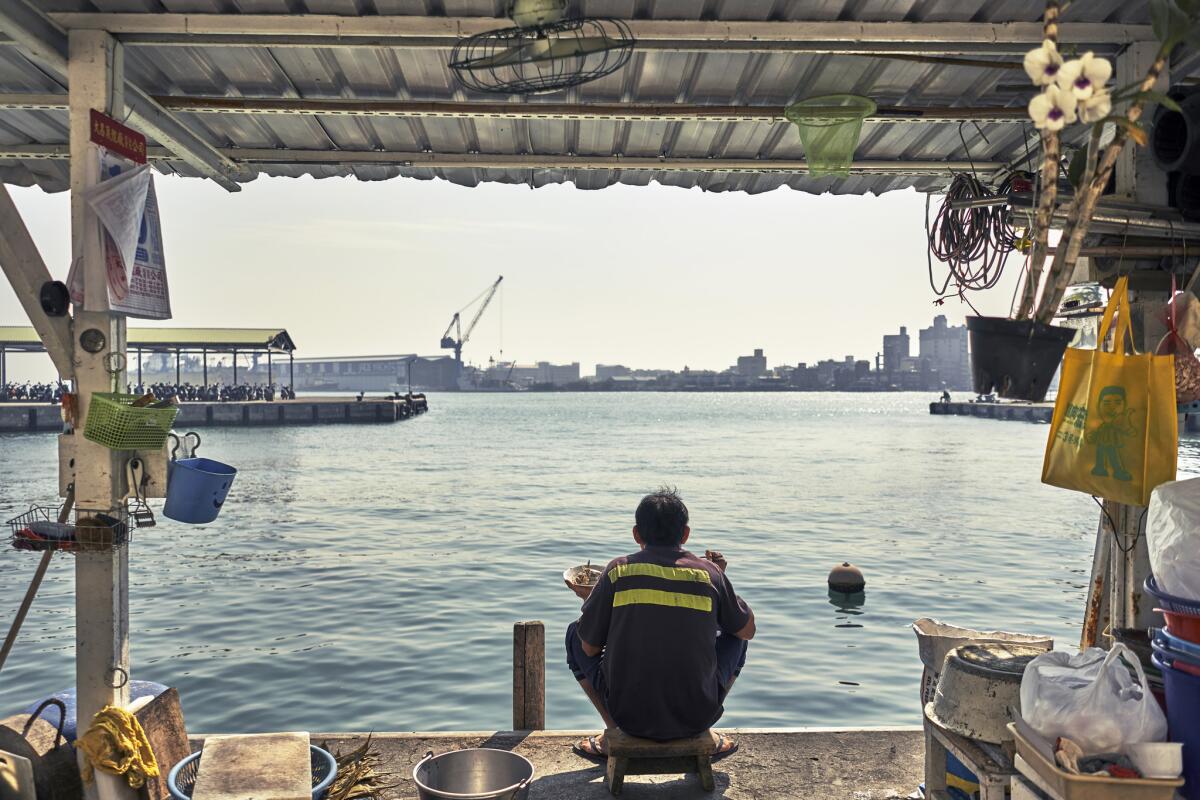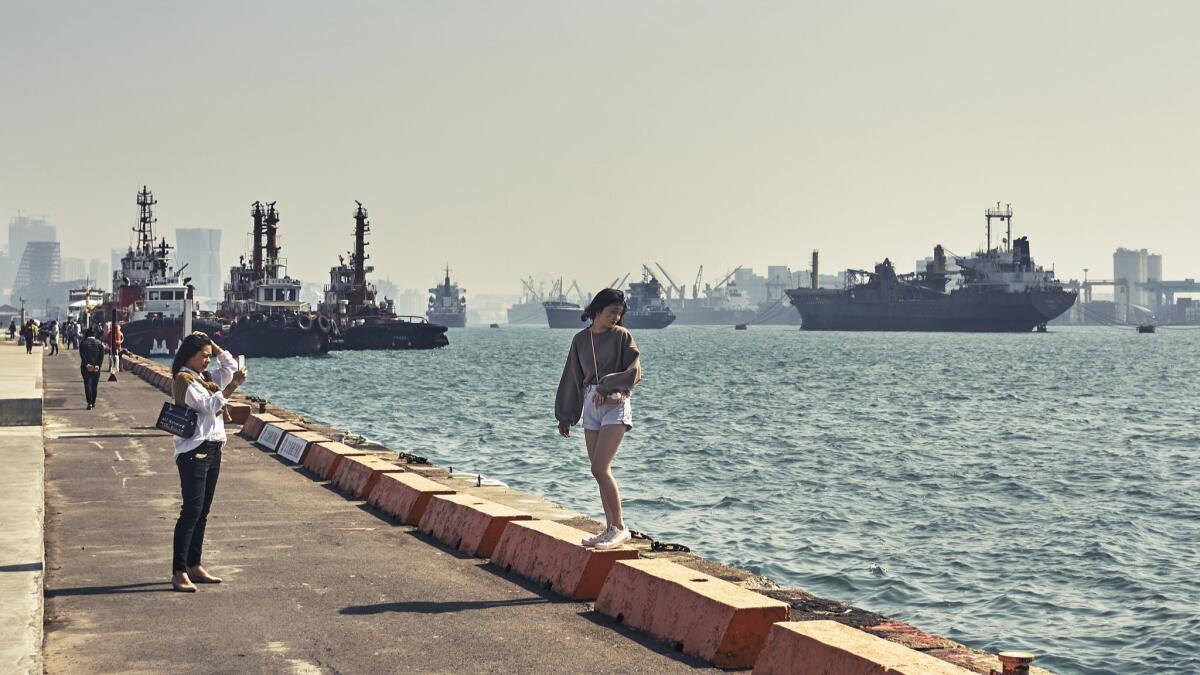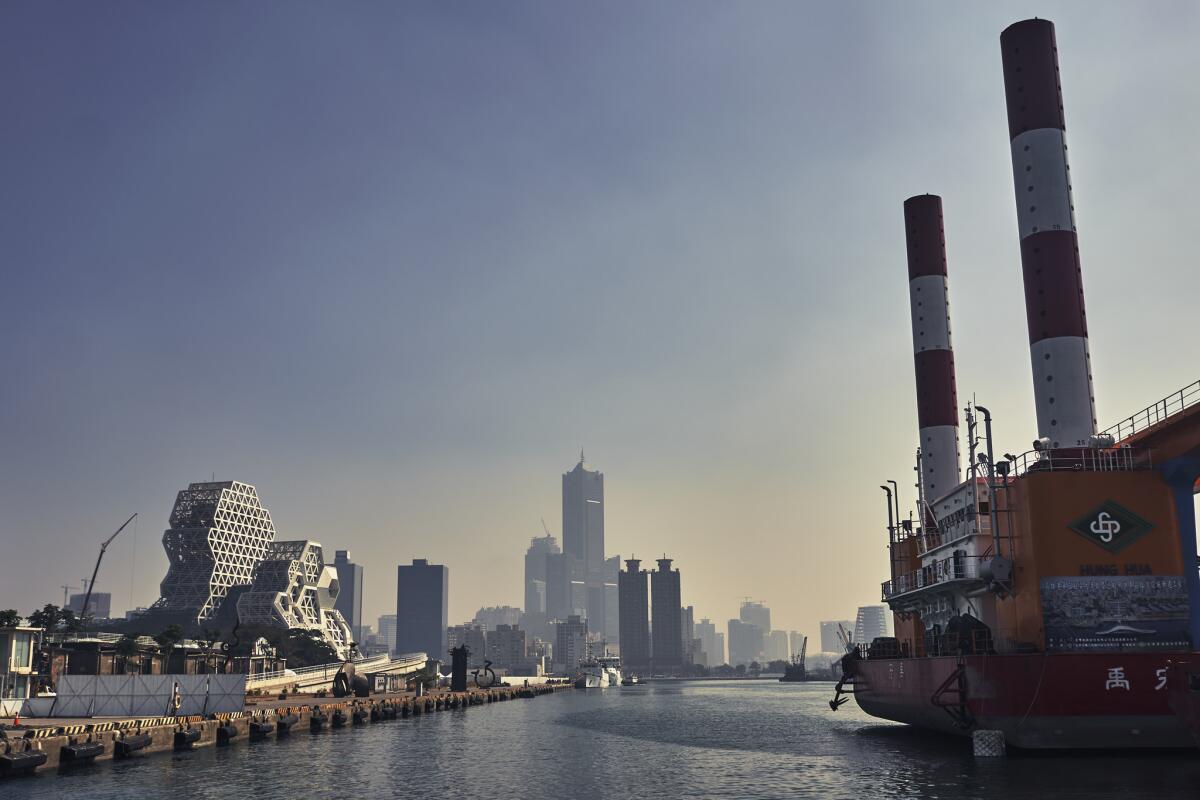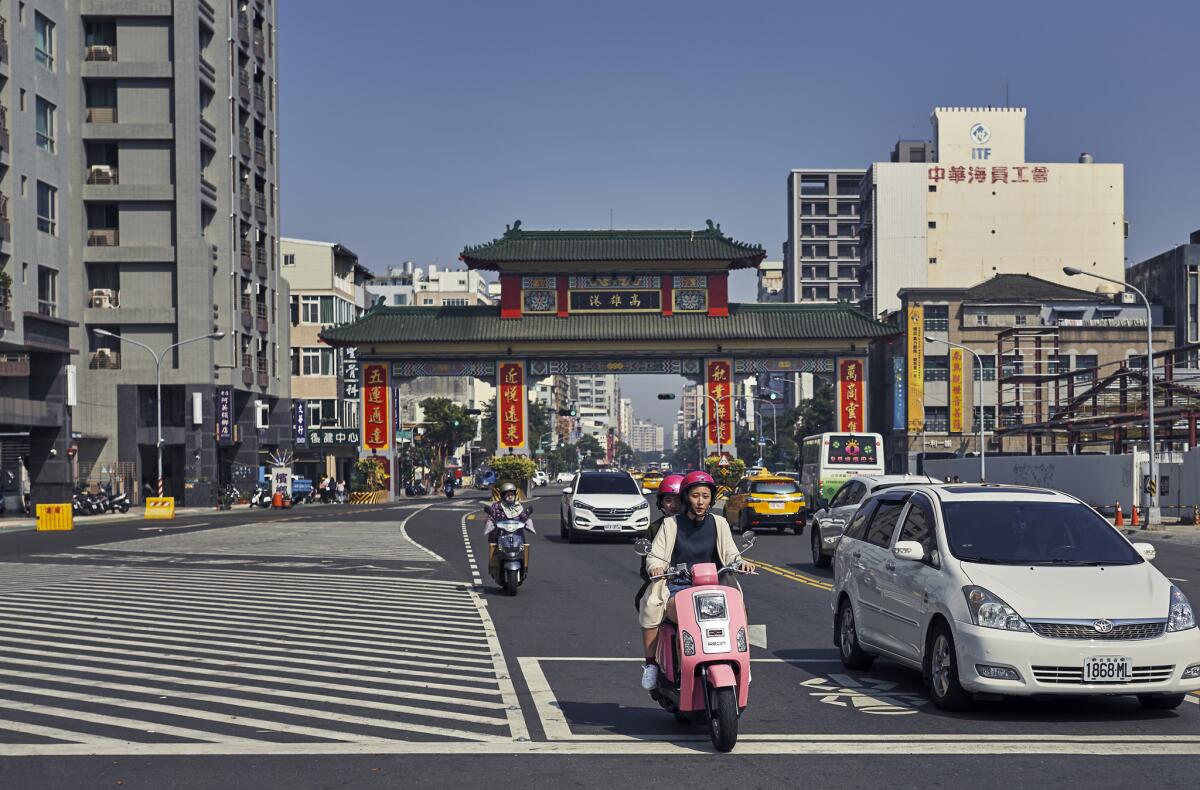China casts a long shadow over Taiwanâs economy, and attempts to revitalize it

Reporting from KAOHSIUNG, Taiwan â For three decades, Liu Hong-chengâs family has peddled apples, oranges and cherries at a morning market in Kaohsiung, Taiwanâs second-largest city. During that time, the Lius consistently voted for the party of President Tsai Ing-wen, who has resisted Chinese pressure to bring the island under Hong Kong-style unification.
In November, fruit seller Liu, in search of an economic jackpot, changed sides. He voted for the winning candidate in the cityâs mayoral election, Han Kuo-yu, a member of the opposition Nationalist Party which embraces dialogue with Beijing. Hanâs slogan: âSell things out, bring people in, make Kaohsiung super rich.â
âItâs not about getting close to China,â Liu, 50, explained of his change in thinking. âItâs about getting close to cash.â
For decades, Taiwanâs economy has been beset by stagnant wages, low growth, and a lack of consumer or foreign investor confidence. Tsaiâs Democratic Progressive Party suffered major losses in Novemberâs midterm election amidst the economic woes, compounded by Tsaiâs unpopular pension and labor law reforms.
Some Taiwanese believe that Taiwan can revitalize its economy by tapping into Chinaâs markets. Hanâs viral campaign for mayor played on popular frustration with Kaohsiungâs stagnation. He branded himself as a âbald-headed vegetable sellerâ who would sell Taiwanese fish and vegetables to the Chinese market, inspiring rap videos with refrains of âletâs get that moneyâ and drawing tens of thousands of supporters to rallies.
Others say that Chinese business canât be trusted. One of Taiwanâs biggest civil protests, the Sunflower Movement of 2014, drew more than 100,000 protesters into the streets against a trade pact that would open Taiwan and Chinaâs service sectors to one another. Since Tsai took office in 2016, Taiwanâs government has pushed policies of industrial innovation and turning to South and Southeast Asian markets, in hopes of reducing reliance on China.
Either way, China looms large in any effort to revitalize Taiwanâs economy: Move too far from China, and the economic giant could cut Taiwan out of supply chains and regional trade agreements, not to mention the second-biggest market in the world. Grow too dependent, and Taiwanâs political future could end up in Chinaâs hands.


Kaohsiung, once one of the worldâs top 10 shipping ports, has tried but failed to rebrand itself as a tourist hub. On a hazy winter morning, only a handful of tourists took selfies at the industrial harbor, posing against a skyline of cargo ships and oil rigs. Rusted signs hung over storefronts downtown, metal screens pulled shut over many of the front doors.
Kaohsiung has invested in a world-class performing arts center, a river with romantic boat cruises, and a metro station with a fluorescent seven-minute light show. But none of these efforts has had a major impact.
Manufacturing and shipping once brought jobs and wealth to Kaohsiung, especially as Taiwan transitioned from agriculture to industry and domestic to foreign export markets. But in the 1990s, China began to open up, just as Taiwanâs labor costs were rising. Taiwanese factories moved en masse to China, bringing expertise and much-needed investment while many foreign investors shied away in response to the jarring Tiananmen Square massacre of pro-democracy protesters.
Thirty years later, China is shifting to a consumption-based economy. Labor costs are rising, so much that many factory owners are moving to nearby nations of Southeast Asia. In heavy industry-centered Kaohsiung, businesses never caught on to Taiwanâs other strong suit, information and communications technology.
Young adults leave cities like Kaohsiung in droves to seek jobs in the capital, Taipei, or overseas, in China or elsewhere. One-tenth of working-age Taiwanese now live in China, according to the Economist, many because the salaries there are much higher.
âYoung people are getting more practical. Itâs not about identity, but about making use of Chinese resources,â said Zhang Teng-chi, professor of political science at National Taiwan University. âTheyâre balancing their belief system versus their practical needs.â
For some small-business owners, Chinese engagement is welcome as long as it means more business. Lin Zheng-xiong, a 55-year-old fruit seller, said heâd been selling bushels of 70 to 80 guavas to hotels back when Chinese tourists came to Kaohsiung. Now he is only selling a few pieces of fruit at a time.
âWe just hope for the economy to get better,â Lin said, adding that he didnât think that Chinaâs unification rhetoric was anything more than talk. âIf they wanted to fight us, they would have attacked us a long time ago.â
Others, though, worry that Chinaâs business is a trap. Shih Te-lung, chair of a Kaohsiung labor union, said the decrease in Chinese tourists in response to Tsaiâs policies showed that Chinese business is dangerously political.
âWhen tourists disappeared, this let a lot of people know that dependence is a problem,â Shih said. âWe want a good economy, but we donât want to be controlled.â
Economists say Taiwanâs problems canât be solved by tourism, agriculture or short-term interest in a politician. Taiwan, they say, needs a structural shift away from its traditional place on the lower end of manufacturing supply chains. More than 40% of Taiwanese exports and more than 70% of its outbound investments go through China. But 79% of those exports are low-value-added midstream components, such as parts for shoes, clothes, and electronics. Those products are then put together in China before theyâre exported, with low returns for the Taiwanese manufacturers.
âWe are always making things for other people, but we donât have our own brands,â said Liu Da-nien, director of the Regional Development Study Center at the Chung Hua Institution for Economic Research.
A few Taiwanese brands have competed well on the global stage, including HTC mobile phones, ASUS computers, Giant bicycles, and 85 Degrees C, a bakery-cafe with several branches in Los Angeles. But they are the exception, and Taiwanâs tech companies have fallen far behind regional giants including Samsung in South Korea and Huawei in China.

âLet politics stay in Taipei and the economy stay in Kaohsiung,â read another of Hanâs slogans. But anything that crosses the Taiwan Strait is inherently political, business included.
âNo one wants to fully rely on China,â said Wang Chun-chieh, professor of political economy at National Sun Yat-sen University in Kaohsiung. âChina doesnât use market mechanisms. Today, if cross-strait relations are good, they send tourists. If not, they donât. China can strangle you politically.â
The U.S.-China trade war has increased pressure on Taiwan, especially with growing global distrust of Chinese technology, the field in which Taiwanese companies are most integrated into Chinaâs supply chain. Taiwanâs government has forbidden government agencies and state-controlled companies from using Huawei products or even having WeChat on their mobile phones, citing cyber-security concerns.
Private businesses are still free to deal with Chinese tech, but may soon have to choose sides between a Chinese or American supply chain.
âTaiwan is already a democracy and the businessmen here in Taiwan have their own business instinct. If they feel that China is still a good market, they will continue to go,â said Joseph Wu, Taiwanâs minister of foreign affairs. But Taiwanâs government wants to provide business alternatives wherever possible, he said, with an emphasis on the United States.
Some worry, though, that Taiwanâs political future may wind up as a bargaining chip in the trade war.
â[President] Trump is a very transactional person. If he sees a deal to be made, I think he will quickly cave in and do things that jeopardize our good will.â said Jason Hsu, a Kuomintang legislator.
After a speech by Chinese President Xi Jinping last month on cross-strait unification, Kaohsiungâs new leaders have been changing their tone.
âWe wonât just depend on Chinaâs market. China is not the focus,â said Pan Heng-hsu, director of Kaohsiungâs tourism bureau.
Even fruit seller Liu remains concerned about China as an existential threat.
âThey can just make you disappear if they want,â he said. âTaiwanese people donât accept that.â
Yet over time, Liu added, Taiwanâs economic interests could eventually lead to voluntary unification. âIf the political situation gets better,â he said, âI think weâll end up jumping over there on our own.â
More to Read
Sign up for Essential California
The most important California stories and recommendations in your inbox every morning.
You may occasionally receive promotional content from the Los Angeles Times.











